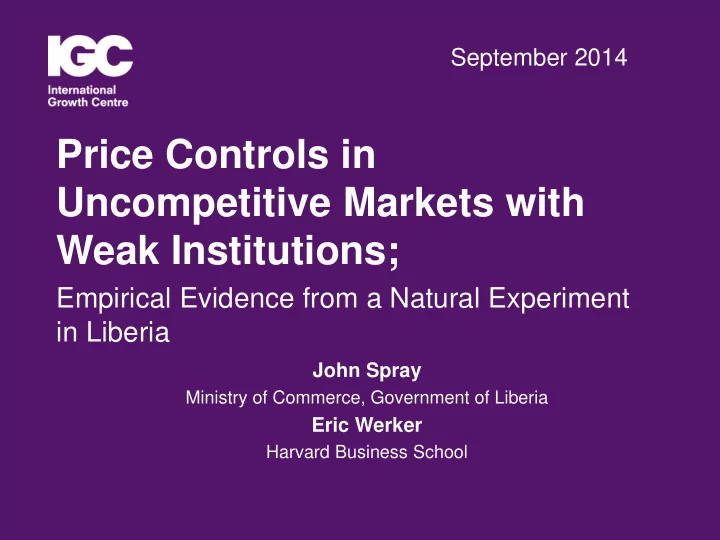

September 2014 Price Controls in Uncompetitive Markets with Weak Institutions; Empirical Evidence from a Natural Experiment in Liberia John Spray Ministry of Commerce, Government of Liberia Eric Werker Harvard Business School
Summary of findings • Do price controls reduce prices? • Yes • Do price controls reduce the quantity supplied? • No • Do price controls have different effects when competition levels and different levels of mark-ups are varied? • Yes • Are price controls a good policy option for countries with weak institutions? • Unclear, but probably not 2
Motivation • Staple of introductory economic theory and public policy • The use of price controls remains a contentious issue. • “ based on noble motives…[but] create welfare losses for both consumers and producers ” Nicholson (2011) • “ reduce incentives for producers ” Prakesh et al (2011) • “ government requisitioning and corruption ” Morton (2001) • Empirical evidence extremely limited and finds mixed results: • Credit card markets in the USA - Knittel and Stango (2003) • Retail gasoline ceilings in Canada – Sen et al. (2011) • French price controls on wide ranging goods - Sheahan (1961) 3
Liberia and Price Controls • Liberia has a small market with a dual economy • Poor and competitive street markets • Elite and inter-connected retail markets • Liberia calculated maximum prices on 333 different goods. • Price controls were completely removed in favour of semi-liberal monitoring. • Policy changes again to just analysing and observing, but not regulating prices. 4
Liberia and Price Controls • Price controls applied across all sectors of the economy • staple goods (e.g. milk, rice, fruit and vegetables) • industrial goods (e.g. cement, building materials, machines) • luxury goods (e.g. artificial flowers, false beards, and musical instruments) Milk (10%) Rice (10%) Cement False beards (20%) (15%) 5
What do we expect? • Six possibilities depending on whether the ceiling is binding and the degree of competition: • Perfect Competition • Competitive markets • Oligopolistic competition and collusive focal points • Monopoly • Corruption • Testable hypotheses using level of mark-up and sale in different markets 6
What do we expect? 7
Ceiling removal led to price rises Treatment and control average price indices, all goods, 2008 – 2011 8
Price rise was more pronounced in retail sector (LHS) Treatment and control average price indices in retail stores, all goods, 2008–2011 (RHS) Treatment and control average price indices in street markets, all goods, 2008–2011 9
No rise in prices after ceiling removal when mark-ups above 35% 10
Ceiling removal led to fall in quantity supplied Comparing quantity treatment and control groups, all goods, 2008 – 2011 11
Alternative Hypotheses • Quality vs quantity • Controlled goods were different • Trends were there structurally • Loss leaders led to different policy 12
Conclusions Two periods after removal of ceilings: • Prices 29.7 % higher than the initial value relative to the counterfactual of no controls • Quantities 18.5 % lower than the initial value relative to the counterfactual of no controls • Effect strongest in retail markets and when price ceilings were most binding • Liberian price controls were effective in supressing monopoly prices 13
Policy Implications? • Not a complete treatise to the welfare effects of price controls • Short-term shortages, waiting costs, general equilibrium effects, etc. • Evidence that uncompetitive markets may need intervention to avoid anti-competitive behaviour. • In Liberia, there is a need to accompany liberalisation with policies to address anti-competitive practices. 14
International Growth Centre London School of Economics and Political Science Houghton Street London WC2 2AE www.theigc.org
Quick Quiz Fill in the blanks “Every _____ family is confronted with a real and pressing problem of higher prices, and I have decided that the time has come to take strong and effective action to deal with that problem.” *American* - Richard Nixon, Address to the Nation, June 1973 "Establish emergency price controls on 22 products in the basic basket to lower the cost of living by more than $600 million for the _____ people and avoid speculation in products,“ *Panamanian* - Juan Carlos Varela, President of Panama, May 2014 "I'm not going to tolerate the energy companies using the fact there's going to be a price freeze to collude in raising prices across the ____“ *UK* - Ed Miliband, Leader of the UK Labour Party, September 2013 16
Recommend
More recommend